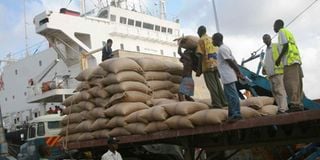MPs want Mombasa port’s grain bulk handling business liberalised fast

Casual workers loading some of the 22,000 tonnes of maize at a container terminal within the port of Mombasa today. MPs now want the liberalisation of grain bulk handling expedited.
What you need to know:
- The tariffs were set in 2000 though they were marginally adjusted in 2008 and 2012.
Lawmakers now want the Kenya Ports Authority (KPA) to fast track authorisation of design, development and implementation of more grain bulk handlers at the facility to enhance competition and optimise revenue collection.
In a report, the National Assembly Finance, Planning and Trade Committee took issue with the current monopoly enjoyed by the Grain Bulk Handlers Ltd, a private entity, and especially low tariffs that it is charged as compared to other grain bulk handlers, saying it is a technical barrier to trade and competition.
Grain Bulk handles 98 percent of grains imported to Kenya according to the report.
"The current rates payable for grain bulk handling under the GBHL service is $3.85 (Sh422.7) per metric tonne as provided for in the KPA Tariff Book while conventional grain bulk handlers are charged $10.4 (Sh1,141) per metric tonne. This price differentiation has presented a technical barrier to trade and competition," reads the committee's report.
The tariffs were set in 2000 though they were marginally adjusted in 2008 and 2012.
Grain Bulk did not immediately respond to Smart Business queries on the report’s recommendations by press time. The KPA did not also respond to queries on the recommendations on the report.
Dry grain
KPA, through a Wayleave Agreement of 1992 for a period of 45 years and License Agreement entered in 2000 for 33 years, designated berths 3 and 4 to Grain Bulk Limited to handle grain bulk vessel discharge alongside the regular dry grain and fertiliser handling that utilises drags for bagged cargo. It is the sole operator for grain bulk handling at the Port of Mombasa.
As part of the 2000 agreement, GBHL was granted exclusive rights to handle the grain bulk business at the port for eight years to allow it to recoup its expenditure before the licensing of other handlers.
After the agreement expired in February 2008, the KPA board resolved to liberalise handling of grain at the port to eliminate monopoly and promote healthy competition but the search for a second grain bulk handler aborted after the government cancelled the tender ostensibly to allow for more stakeholder competition. KPA now plans to conclude the process by next year.
With grain handling at the Port of Mombasa projected to grow by seven percent annually, MPs concurred that there is need to licence more operators but hastened to add that the process must be fair, open, transparent and adhere to the Public Procurement and Disposal Act 2005 to ensure non-discrimination and accountability.
Among those who have expressed interest in the grain bulk handling business are Kilindini Terminals Ltd, Kapa Oil Refineries, Africa Ports and Terminals, Multiship International and Kipevu Inland Container EPZ Ltd.
Expansion
The committee recommended that KPA should pursue alternative locations to discharge grain vessels particularly at the Dongo Kundu Special Economic Zone (SEZ), the upcoming Kisumu and Lamu Ports with consideration to space and business model applicable under the Public Private Partnerships (PPP) framework.
To promote efficiency, the committee, which is chaired by Homa Bay Women Rep Gladys Wanga, wants the government to provide critical infrastructure to continually expand and sustainably gain leverage in technology while maximising return on investment. Such critical infrastructure includes wide berths and state of the art vessel handling equipment.
"KPA should continue investing, including through the PPP framework, in expansion of the Port facility to accommodate more berths to meet the growing demand in the region," says Wanga in the report.





